Types and varieties of philodendron
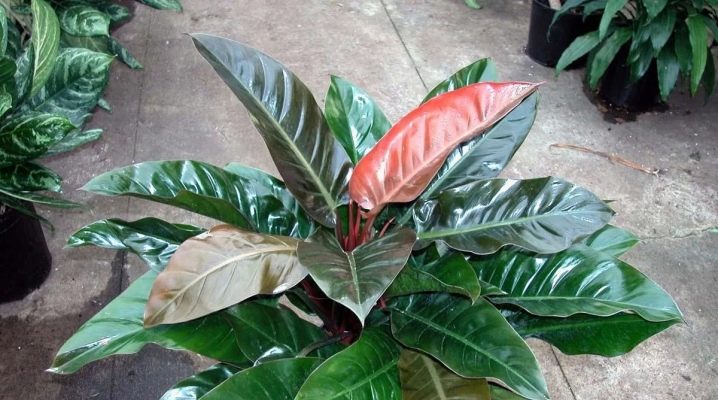
Today, indoor plants are an integral part of every house and every apartment, as well as any place of civilian use, such as an office or a shopping center. And this is not surprising - after all, evergreen indoor plants, thanks to their properties and characteristics, create an atmosphere of warmth, home comfort, good mood, and freshness.
In addition to the fact that house flowers produce oxygen, thereby enabling people to breathe clean air, this is a decoration and a highlight of any room.
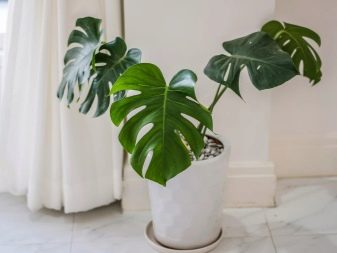
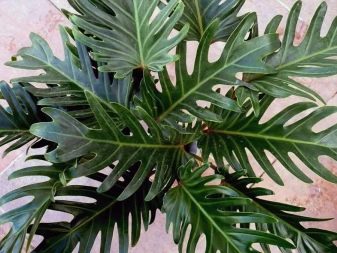
The range of flowers and plants that can be grown at home is simply huge. The modern flower market offers a very wide selection of both well-known and familiar plants, as well as exotic ones.
Among all the variety of evergreens, I would like to highlight the philodendron, a plant that amazes the imagination with its beauty, and in most cases, its size. In the article, we will get acquainted in more detail with this amazing plant, its varieties, as well as the peculiarities of caring for this "inhabitant of the jungle".
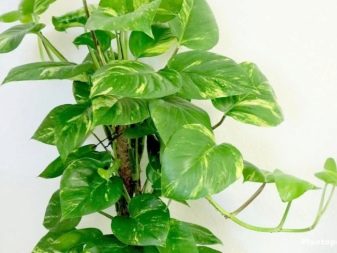
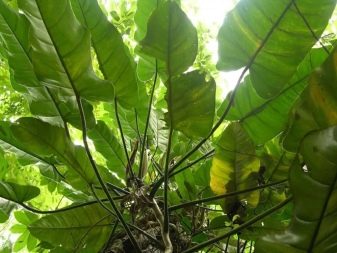
Description
Philodendron is a tropical plant that came to our area from Mexico, South America or the Pacific Islands. Plant of the aroid family. To date, about 900 different species are known, but botanists say that most of them have not been studied yet.
It is an evergreen plant that resembles a real vine. It can be small and neat, which is grown at home, or it can be a real giant that is used to living and growing in a real jungle. The plant belongs to epiphytes, flowers, in most cases growing on trees, and aerial roots attached to them. The root system of this flower can be aerial, underground and ground. He has a round, large leaf of all kinds of different shades.
It should be noted that the leaves of Philodendron contain formaldehyde, which makes the plant a medicinal plant.
If you properly care for the philodendron, satisfy all his preferences and wishes, the flower throws out a very beautiful color. Its flower bud resembles an ear. In order for the plant to bloom, it needs to stand outside for a certain period.
Today, the philodendron can be found in a wide variety of places. This is quite logical, the plant is very beautiful, massive and perfectly fills the space even on its own.
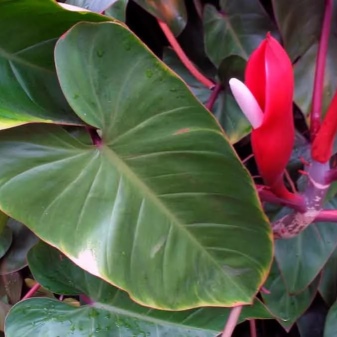
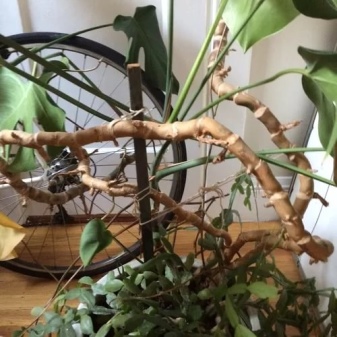
Varieties
Let's take a closer look at the species and varieties of philodendron, which are the most popular and frequently encountered.
- Guitar-like. The length of an evergreen liana is a maximum of 2 meters, so in most cases it is tied up. As a stand for it, you need to use a support covered with moss. It is installed during plant transplanting to keep the roots intact.
The recently appeared leaves of the guitar-shaped philodendron visually resemble a heart, and the already ripe leaves of the guitar, hence the name.
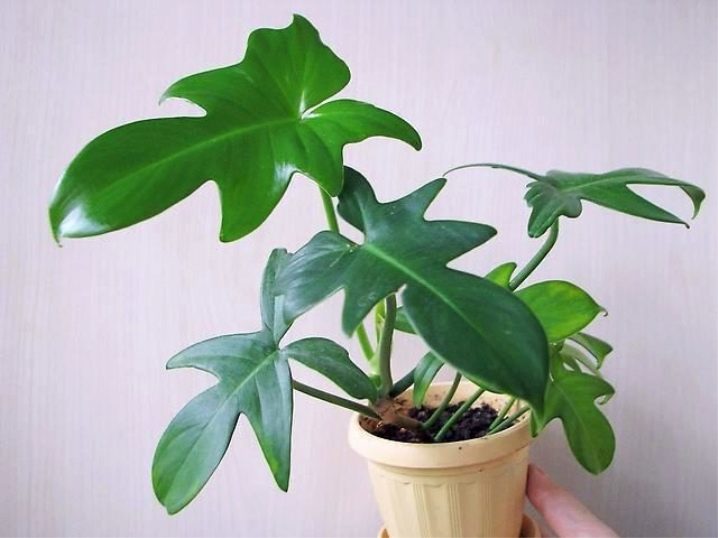
- Drip-bearing. The foliage of the droplet semi-epiphyte has an oblong shape and a sharp end. And also this type of flower is characterized by a green color of the leaves with the presence of white veins on them. If you fix the flower in an upright position, then the size of its leaves can reach 25 cm.If you do not tie it up, then the maximum size of the leaves will be 15 cm.
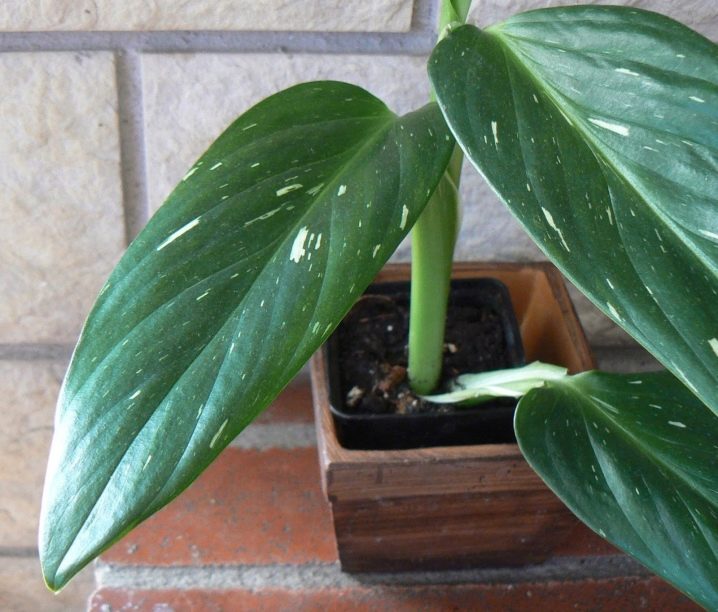
- Scaly. The trunk of the scaly liana is hard and drooping.Young leaves of this evergreen flower have three lobes, while older ones have five lobes. The color of the leaves is bright green with scarlet veins. The size of a mature leaf can be up to 30 cm. The great advantage of this variety: it blooms exclusively as a houseplant.
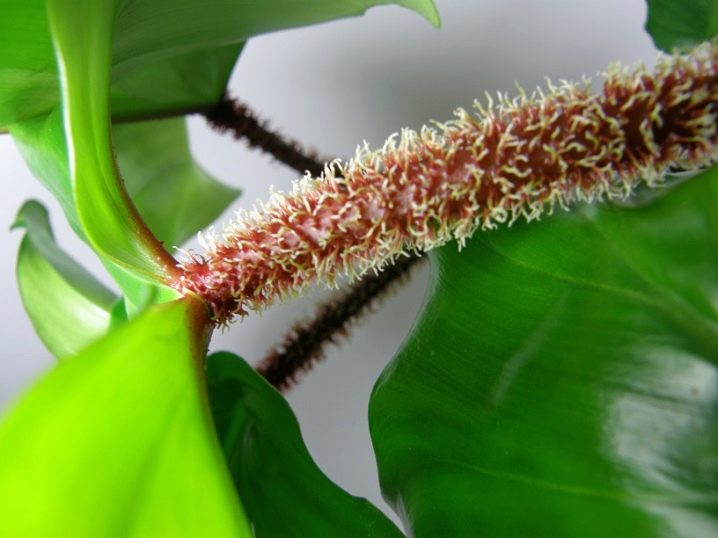
- Warty... It is characterized by a bronze-green leaf with white veins on it. The leaf shape is cordate. The size of the leaf reaches 17 cm. The maximum height of this type of vine is only 2 meters.
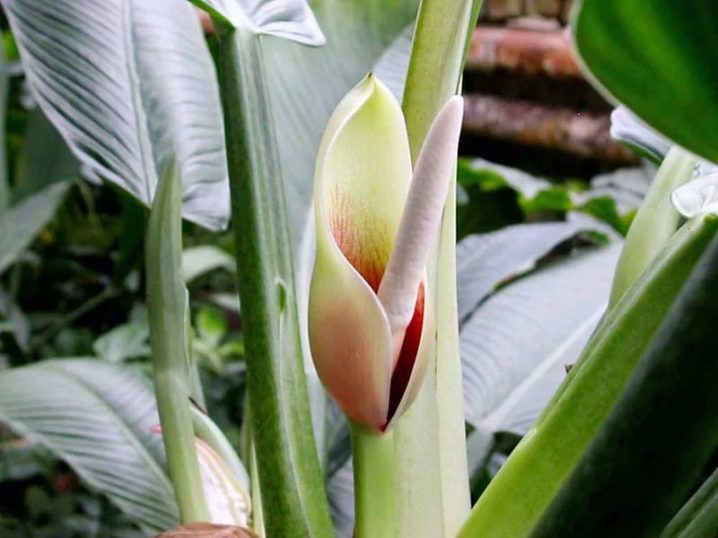
- Elegant. It is a tall, large-leaved plant with only one trunk. Most often it plays the role of a houseplant for a high room and is the highlight of the winter garden. The liana is 70 centimeters long and 30 centimeters wide.
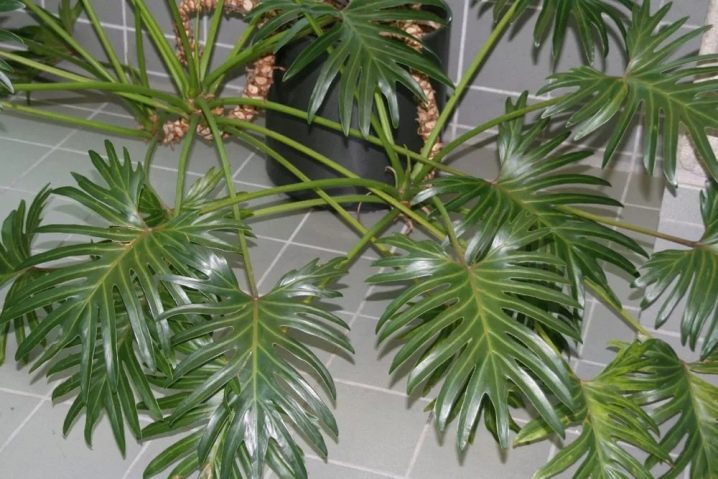
- Climbing... Another name, better known, is the ivy philodendron. The ideal planting site for this species is a hanging pot, it is in the hanging position that the plant propagates. The leaf is very elastic, dark green in color, up to 15 cm long, up to 10 cm wide. This variety of liana is also known for the smallest leaves, but as for the height, it can reach 20 meters.
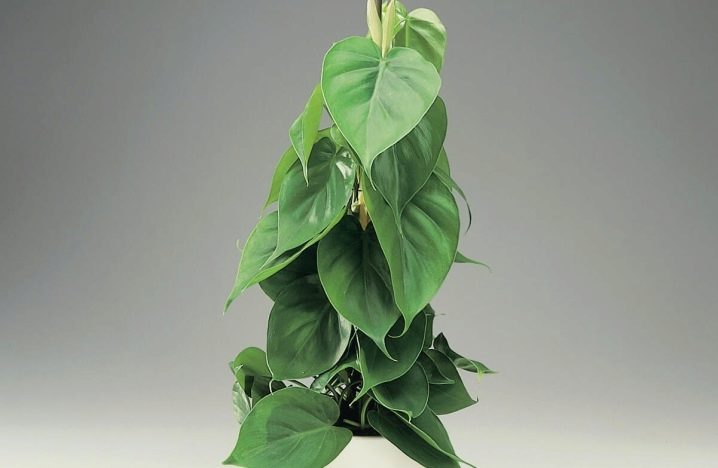
- Philodendron Sello. The maximum plant height is 2 meters. A distinctive feature of the variety is an even vine and a leaf that has an ovoid shape and about 10 or even more sections. The older the plant, the deeper the cuts in the leaves become. The leaf of this type of flower is quite impressive in size, up to 70 cm.
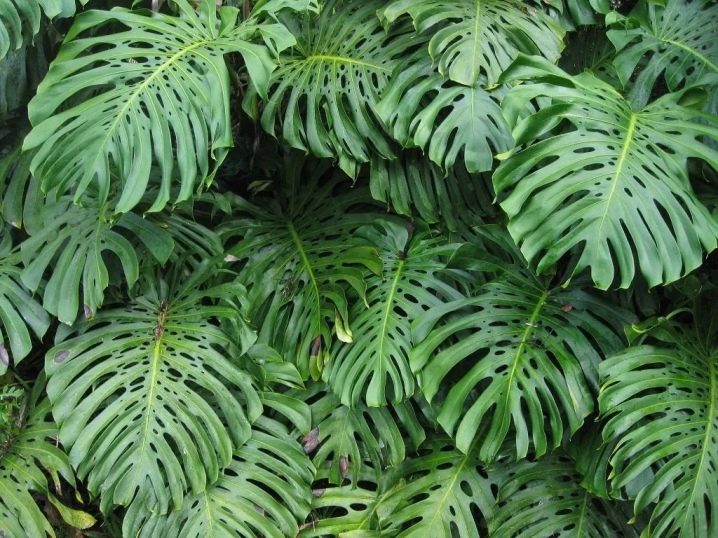
- "Atom"... This plant is small in height, maximum 60 cm. It is characterized by slow growth. Visually, this is a rectilinear bush with curly bright green leaves, the size of which is up to 30 cm.
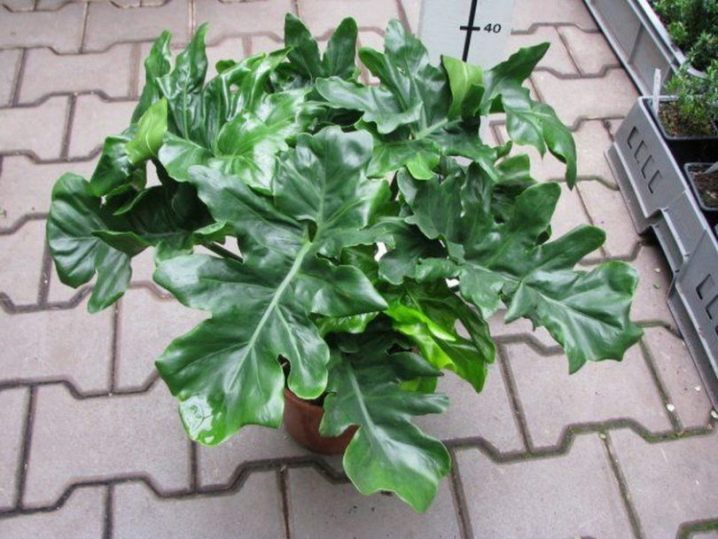
- Blushing. The smallest liana among all other species. Its leaf size is larger than the length of the stem. The leaf is heart-shaped and light green in color. The leaf width reaches 50 centimeters.
If you grow this type of philodendron at home, then the maximum growth will be up to 1.5 meters.
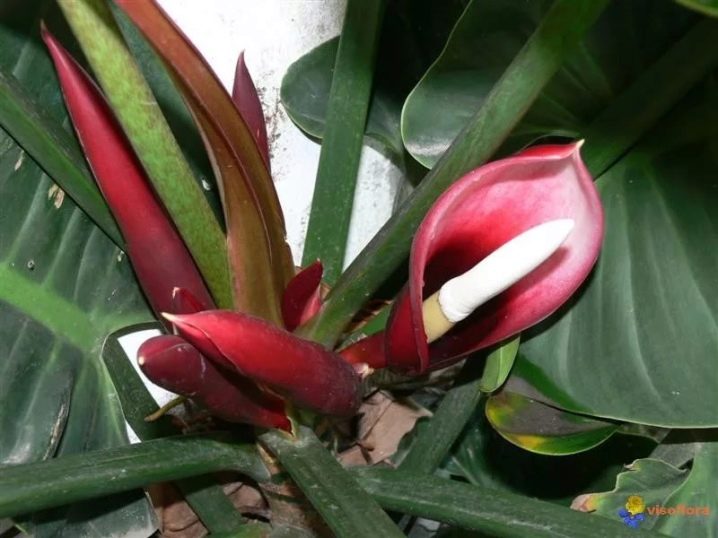
- Xanadu. The leaves of this philodendron variety are huge and have a dark green color. The older the plant, the tougher the leaf becomes, and over time it takes on a zigzag shape. Liana bush, its height is 1.5 meters.
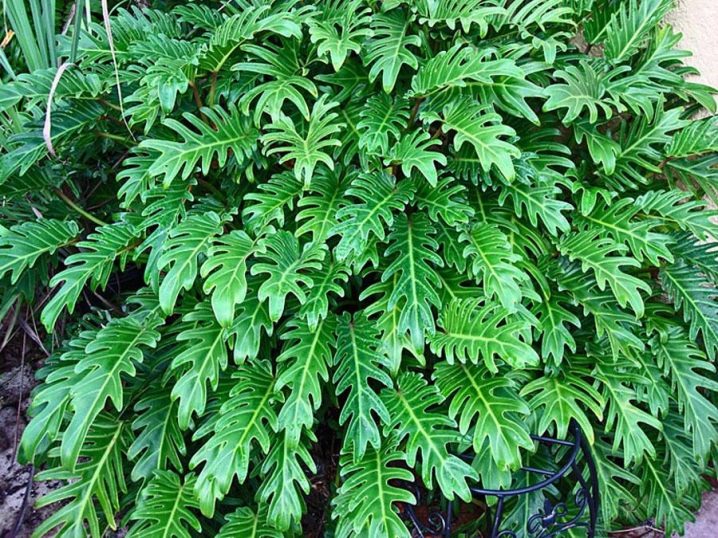
- Bipinnate. A very lush plant. It is characterized by large, rough, oak leaves, maximum 90 centimeters. The bloom has a burgundy color with a white center. Flowering throws out an arrow about 20 cm. This philodendron is ideal for indoor use.
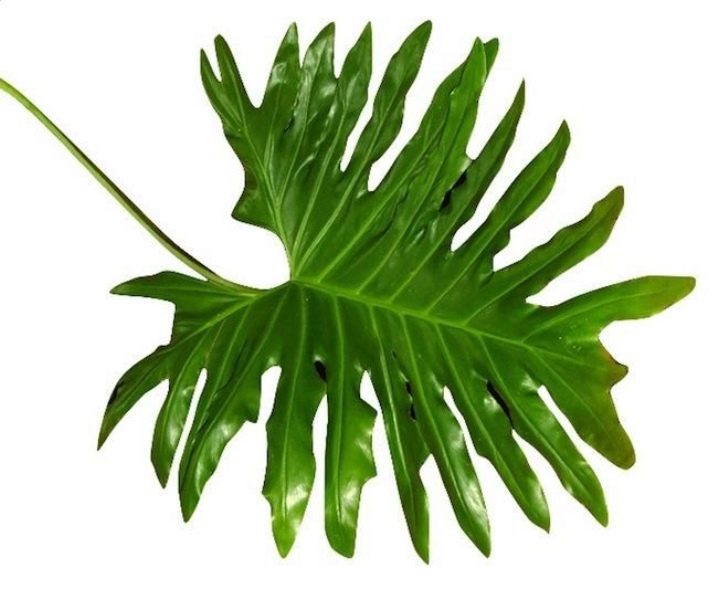
- Hastate. This plant is characterized by a bright green leaf, the surface of which is smooth and shiny. The liana has a very thin trunk, and it grows quite quickly, so the garter is a prerequisite for its full growth and development.
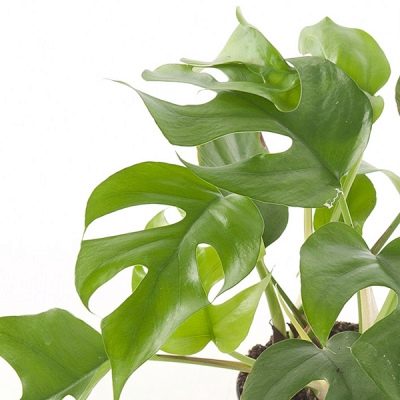
- Philodendron Martius. This liana is characterized by the presence of a small main rod, the height of which is 30 cm, while a young plant does not have it at all. The leaf is 55 centimeters long, 25 centimeters wide, but its shape is oblong, heart-shaped, whole and long.
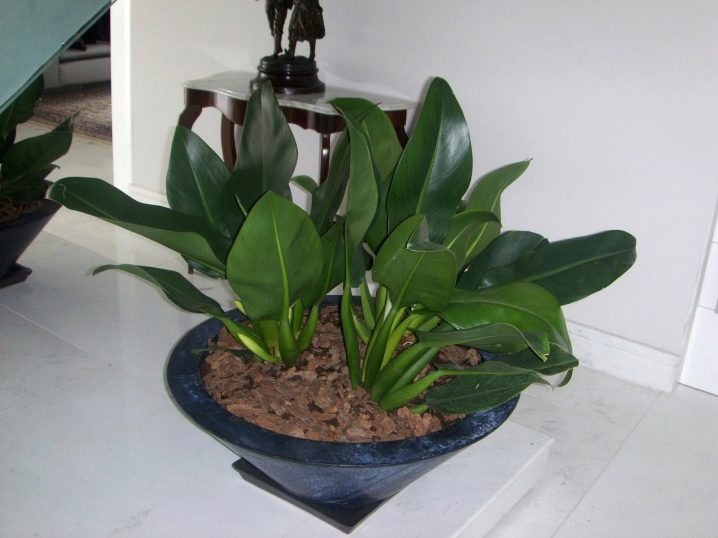
- Black and gold. Liana is characterized by the presence of a fragile, thin and high trunk, as well as a long heart-shaped leaf, dark green, almost black, the size of which reaches 80 cm.
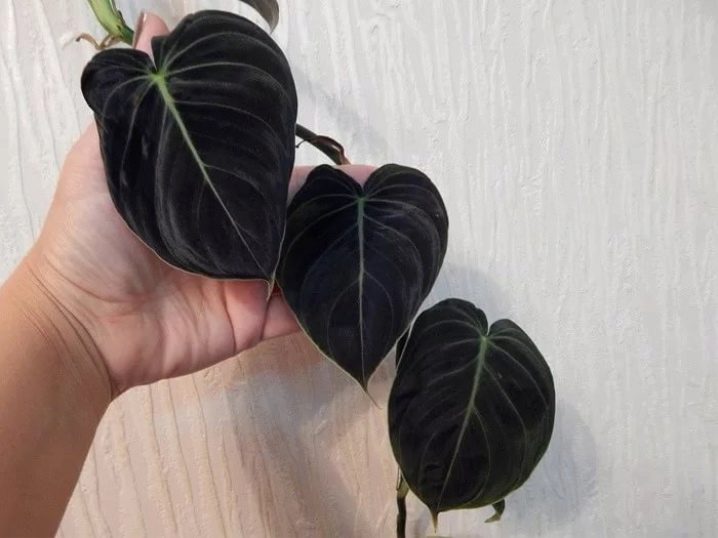
- Philodendron Ilseman. This is a decorative liana, for which a support is a mandatory factor in growth, its height is 1.5 meters. The length of the leaf does not exceed 40 cm, the width is 15 cm. As for the color, there is no way to name one, this variety of liana is distinguished by the heterogeneous color design of the leaves.
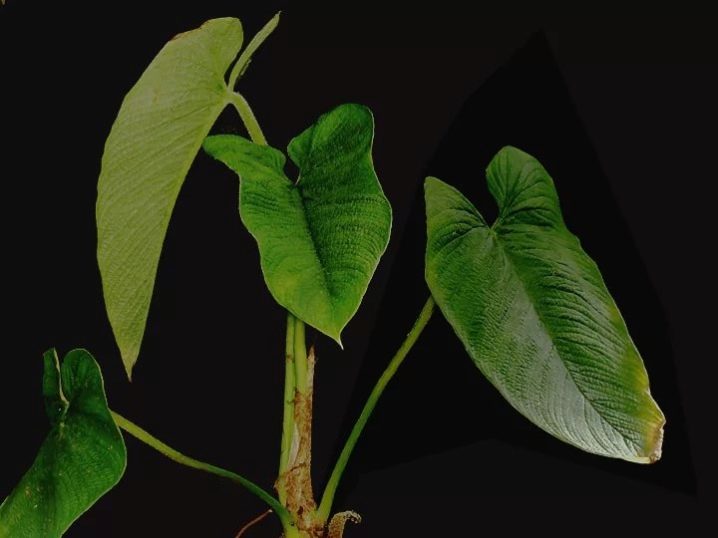
- Radiant. The leaf is a happy owner of a uniform green color and small size, its length is 20 cm, width is up to 15 cm. An excellent option for growing at home.
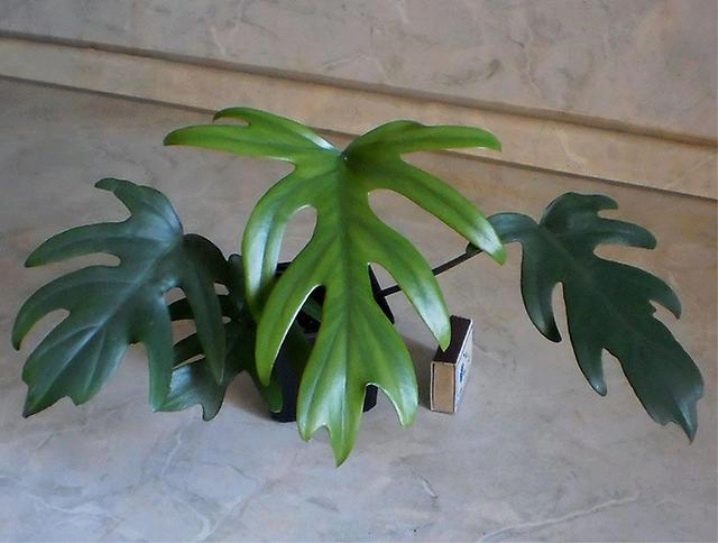
- Philodendron Evans. The plant is characterized by the presence of very large leaves, the length of which is 80 cm, the width is up to 60 cm. The leaf shape is oval, with a sharp end and wavy edges.
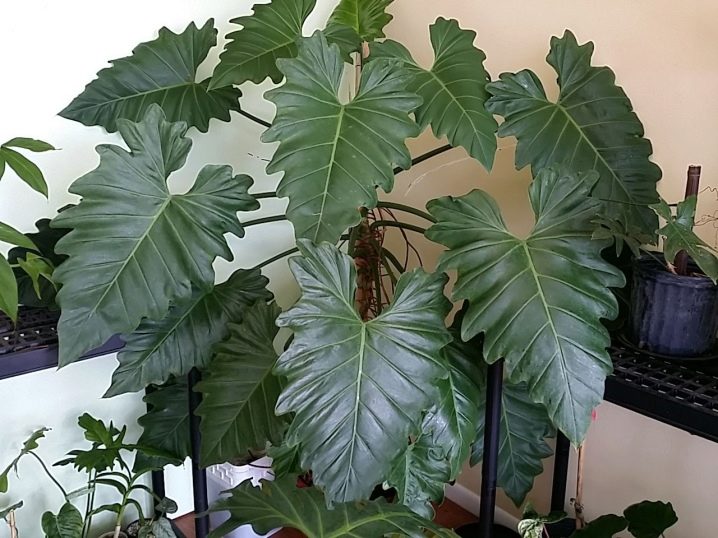
- Stop-shaped or lobular. One of the varieties of philodendron, it is considered an ideal plant for growing indoors. This flower is characterized by dense foliage, due to which a rather thick, strong trunk is formed. As the flower grows, it begins to need support. It is good to use a bamboo stick with moss as a support. The leaf is dark green in color, similar in shape to a triangle. The size of an already adult leaf is 40 cm in length and 15 in width.
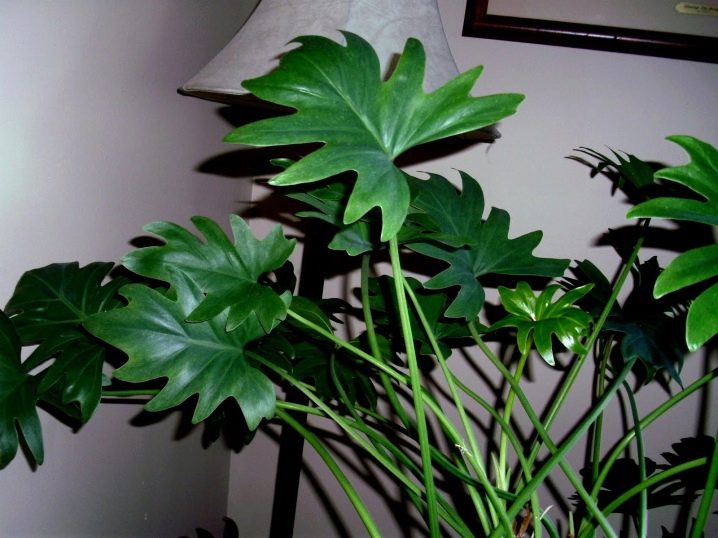
- Goldie Lock or Lemon Lime... Liana has compact, young leaves of a yellow-green color (hence the name), which then turns into light green. This variety is unpretentious: it tolerates low humidity very well.
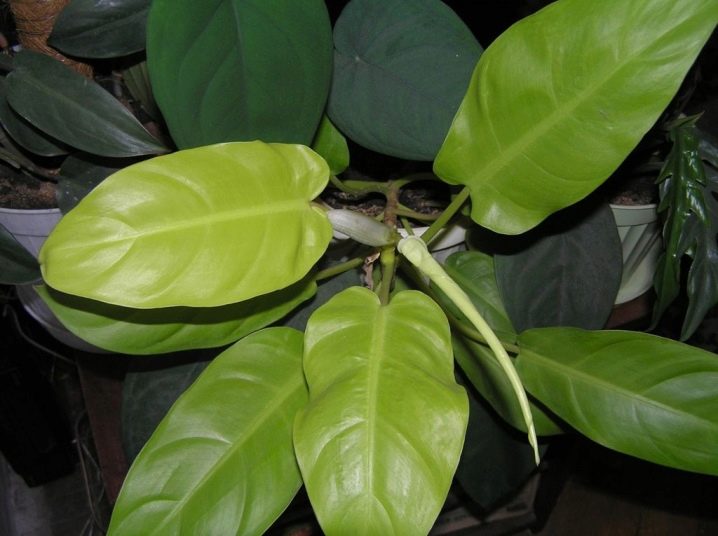
Home care rules
Philodendron is an unusual, exotic plant for which the jungle is the most acceptable habitat. There are also varieties that grow without problems not in the jungle, but at home, the main thing is that the correct and suitable microclimate is created.
It is necessary that the conditions in which he lives were the most favorable for his development, growth and well-being.
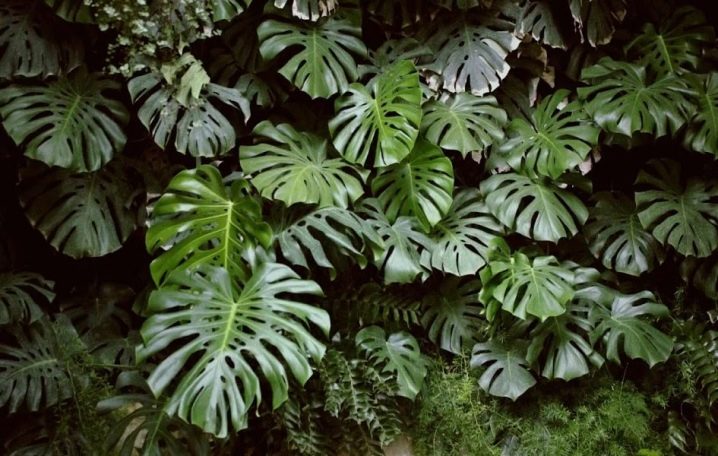
Let's look at how whimsical the plant is to care for, and how to properly create the necessary and comfortable environment for it.
- Location. Philodendron is a plant that cannot tolerate drafts and air conditioning. It is thermophilic, in the hot period in the room where the flower is located, the temperature should be + 18.22 ° C, and in the winter period not lower than + 15 ° C. In winter, the plant needs additional light, which it can receive from a fluorescent lamp. It is also necessary to avoid direct sunlight, from which the leaves get burned and dry. But a dark corner of a room won't do anything good either.
- How to water. Before proceeding with watering, the water must be defended so that chlorine impurities are removed. Water not only the roots, but also spray the foliage. The plant loves moisture very much, so spray it 2-3 times a day, especially if it is located near a heater.
- How and when to feed. To feed the philodendron, you can purchase a special complex at the flower shop. The amount of dressings that the plant needs is small, in the summer 1 time per week, and in the winter 1 time per month. Before adding fertilizer, the vine needs to be watered. With the necessary amount of fertilizer, the plant will grow continuously and delight its owners.
- The soil. Spring is the period when the philodendron needs to be transplanted, separating the "kids". It is very important here to properly organize the potting mix. There are several mix options that are perfect and you can make your own.
If you don't want to mess around and prepare the soil yourself, you can purchase a ready-made substrate.
Remember that with proper, high-quality care, taking into account all the needs of the flower, the vine will constantly grow, develop and, perhaps, even bloom.

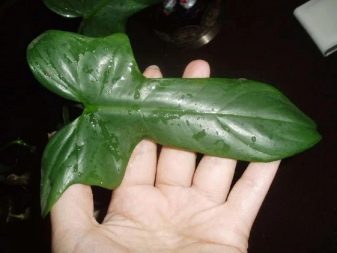
It is very important that any work associated with this plant (transplanting, cutting leaves) must be carried out strictly with gloves. This is due to the fact that the juice contained in the trunk and leaves is poisonous, and getting it on the skin of a person is fraught with consequences.
For information on how to care for a philodendron, see the next video.




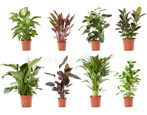
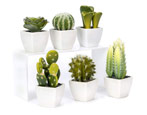
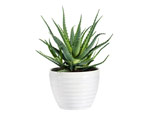
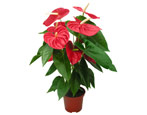
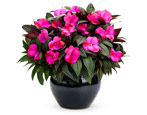
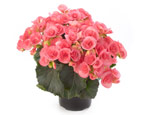
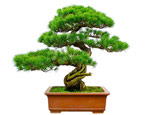
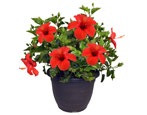
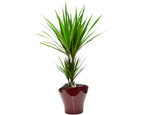
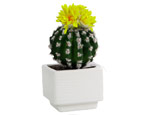
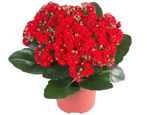
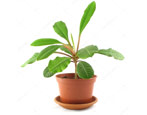
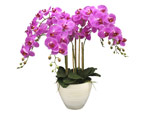
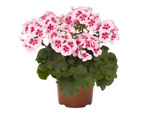
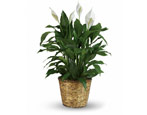
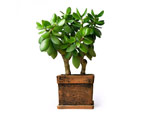
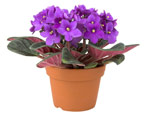
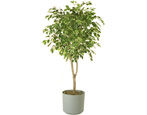



The comment was sent successfully.